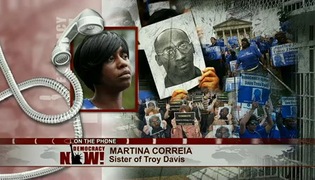
The funeral of Georgia activist Martina Correia, the older sister of former death row prisoner Troy Anthony Davis, was held earlier this month in her home town of Savannah, Georgia. She passed away December 1 after a more than decade-long battle with breast cancer at the age of 44. At the same time as she fought to save her own life, Correia struggled valiantly to save that of her brother’s. Davis was executed by the state of Georgia on September 21, despite major doubts about evidence used to convict him of killing police officer Mark MacPhail, including the recantation of seven of the nine non-police witnesses. “She leaves behind a tremendous legacy,” NAACP President Ben Jealous says. “Martina really had inspired activists around the country, including young activists.” [includes rush transcript]
Transcript
AMY GOODMAN: We wanted to go back to Ben Jealous to ask about a few other issues and developments, around issues, for example, of the death penalty. I last saw you, Ben, at the execution of Troy Anthony Davis on September 21st. You were there as part of about a thousand people off and on the Georgia death row prison grounds who were protesting his execution. Then I saw you at his funeral. And I wanted to ask you about the latest death of Troy Anthony Davis’s sister, Martina Correia, who was so well known for fighting for two lives, for her brother, Troy Davis, and also for her own in her long battle with breast cancer. She died just a few weeks ago at the age of 44. She was buried on International Human Rights Day on December 10th in their home town of Savannah, Georgia. And I wanted to just play a clip of Martina Correia speaking to us at Troy Davis’s funeral in October.
MARTINA CORREIA: I know my brother is happy because he’s laying to rest with my mother. And they’re probably looking down on us, asking us what our next move is, but I think he already knows, because this weekend has been such a powerful weekend, to see so many people come together and want to stand and fight and want to change the laws. And we’re going to go to the Georgia State Capitol, and we’re going to start working on that gold dome. And they’re going to have to listen to us, because we’re their constituents, and we voted them in, and we can vote them out. And I know that’s one thing that we’ve had to learn, that we have to make people accountable who are speaking on our behalfs. And Troy made us all look within ourselves, and he made us see that there’s goodness in all of us and that all of us have to continue to fight.
AMY GOODMAN: That was Martina Correia, who, at the funeral, talked about—actually expressed hope that this was the beginning of an anti-death penalty sort of resurgence in the United States. First, could you comment on Martina herself?
BENJAMIN JEALOUS: She was a bright light. She was a tough fighter. I had known Martina for over 15 years. We met at a conference of the National Coalition to Abolish the Death Penalty. And she stood out of then, and she inspired us then.
And, you know, about 10 years ago, we all learned that she had a very bad cancer, and the doctors didn’t expect her to live, I believe, even more than a year. And yet, she kept on fighting. And people often said it was the fight to save her brother’s life that was keeping her with us. And so it seems. I mean, just a couple months after he’s executed, she passes on from the effects of chemotherapy. She had actually beaten cancer, but could not—I guess it was the cure that killed her, if you will.
And she leaves behind a tremendous legacy, herself was part of a legacy. Her mom had been active in the student sit-in movement, been active in the NAACP. Martina really had inspired activists around the country, including young activists, as she did me. I was just a few years younger than her, but—when I met her in my early twenties. And she leaves a son, De’Jaun, who himself is a powerful activist and, I think, will do a lot to extend his mother’s legacy, as well as her sisters, who have taken up the mantle. And all of us, you know, both deeply saddened by her passing, Troy’s passing, the passing of their mother Virginia earlier this year, but also deeply committed to finishing the work of abolishing the death penalty in this country.
AMY GOODMAN: The hashtag that NAACP started, #toomuchdoubt, now the number two hastag in the whole topic for 2011 on Twitter.
BENJAMIN JEALOUS: Yeah, no, that’s right. Apparently second only to Beyoncé’s pregnancy.
AMY GOODMAN: And also—
BENJAMIN JEALOUS: Which I think says—
AMY GOODMAN: North—
BENJAMIN JEALOUS: I mean, that says—I mean, that says a bit about the power of Martina, that she could, from Savannah, from a working-class family, really be the spark for a campaign that could actually get the country to focus on a serious issue almost as much as they focused on Beyoncé’s pregnancy.












Media Options